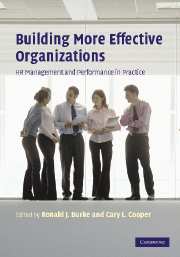Book contents
Preface
Published online by Cambridge University Press: 05 June 2012
Summary
Organizations today are facing heightened challenges in their efforts to perform effectively. These include increasing levels of competition, the internationalization of business, accelerating pace of change, technological advances, meeting the needs of an increasingly diverse workforce, more demanding customers and consumers, greater concerns about corporate governance and board transparency and increasing threats and costs of international terrorism and national security. These are very challenging – and exciting – times to be in senior levels of management. These challenges, with their accompanying difficulties, are being reflected in the shortened tenure of senior level executives as they voluntarily or involuntarily leave their positions.
There is increasing agreement that the unique competitive advantage organizations have today lies in their people, their human resource management practices and systems, and their cultures (O'Reilly and Pfeffer, 2000). All other elements of production ((financial, physical plant, technology, products and services) can be readily obtained, bought or copied. We are now in the era of human capital (O'Toole and Lawler, 2006); to be successful organizations need to unleash the talents of their people.
Fortunately the past decade has produced considerable understanding of what high or peak performing organizations look like. But a huge gap still exists between what we know and what managers do – what Pfeffer and Sutton (1999) refer to as the “knowing-doing” gap.
- Type
- Chapter
- Information
- Building More Effective OrganizationsHR Management and Performance in Practice, pp. xv - xxvPublisher: Cambridge University PressPrint publication year: 2007



